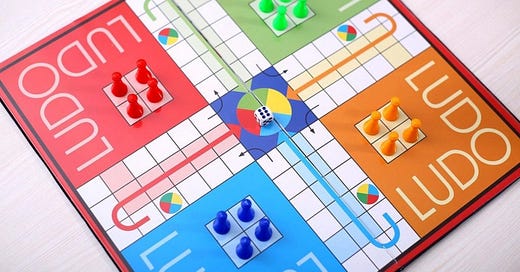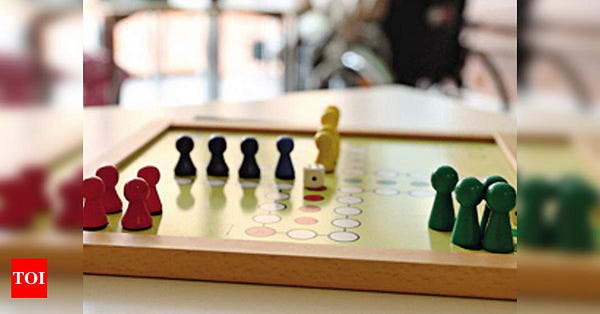Ludo, Chappals and more: Why Courts decide on what seems inane
Courts decide on what seem to be inane matters regularly, why?
Our Constitutional Courts rightly receive a significant amount of scrutiny and criticism for what some see as warped priorities and judicial overreach. There is of course, a lot of undeserved criticism as well. An example of this is the regular trolling online of courts deciding on matters that seem rather silly such as whether or not Ludo is a game of skill or game of chance, or whether or not a footwear without a backstrap is a chappal or a sandal.
These matters seem inconsequential and needless at the outset, especially considering the amount of pendency in the system, which is at 58 lakh+ cases at the High Court level and 67,000 cases at the Supreme Court.
However, there is some amount of context in such random topics being decided on by the Courts. What seems like flippant issues do in fact have significant commercial and economic consequences.
Customs Duty, Chappals and Sandals.
In the case of the Chappal dilemma that the Delhi High Court on whether a footwear without a backstrap is a chappal or sandal, the matter came down to taxation rates for the items.
The matter originated from a dispute originating in 2003, when a company exporting women’s chappals claimed that the item is a Sandal while the Customs Department opined that it was a chappal.
Why was this categorization important? Because it would affect the amount of ‘drawback’ or a refund on the customs duty they paid for the import of raw materials. A chappal would only get 5% drawback, while a sandal would get a 10% drawback.
This tax dispute then squirrelled up the system - the Council of Leather Exports, the Footwear Design and Development Institute before it reached the Delhi High Court and its Judgement was delivered in 2017.
The matter is of course a clear illustration of how ‘bizarre’ our tax system as a Firstpost Article described it. More than bizarre, it is needlessly and unnecessarily complicated partly due to bureaucratic neuroticism and ‘lobbying’ by industries.
While it is admittedly funny to troll the High Court for dealing with matters such as this, it is also important understand the context in which such disputes arise. In a modern administrative state, the Legal system has to deal with all forms of disputes that will have repercussions in many sectors.
These matters that appear in perception to be small and inessential are not so in the broader commercial sense and the issue of pendency is a structural and institutional one, not which one can really be solved by eliminating decisions such as this.1
Ludo as a Game of Skill or Chance?
Recently the Bombay High Court has decided to consider the matter of whether or not Ludo is a game of skill or of chance. Now this again seems like an inane matter for the court to decide. However, if one were to dig deeper than the headline in the Times of India tweet, it would be apparent that there's more going on.
The matter concerns an FIR against a company that operates online Ludo with money at stake. The FIR was filed by a Maharashtra Navanriman Sena Politician who apparently saw children play Ludo with money. The private complaint that was filled was dismissed by the Metropolitan Magistrate as a result of which the Bombay High Court was approached. The Magistrate had rejected the complaint that was initially filed on the basis that Ludo was a game of skill and not of chance.
This is issue here is that whether playing Ludo with money is gambling, which is banned. The general idea is that games of chance, whose outcomes are not affected by the skill of a player, is gambling and therefore illegal in most states. The state-wise situation depends on regulation by the State Legislature - which is why Goa for example, has Casinos.
This issue of what constitutes a game of skill or chance has come up multiple times in the past - the Supreme Court has for example decided that rummy is a game of skill, horse racing is a game of skill, and dismissed some time back petitions against online rummy, which continued to be held as a game of skill.
It is clear that there is nuance and context in which the Bombay High Court has been asked to decide whether or not Ludo is a game of skill when played with money is in fact a decision on whether or not it is illegal or not.
Small legal nuances and minutiae such as this becomes very crucial. The High Court's decision to hear such an issue should be understood within its context as well and not as an amusing venture by the court on its off-time.
[It should be noted that the matter itself came into hearing because a senior counsel mentioned the matter and that the senior politician of the MNS filed the complaint.]
Disclaimer: The System is flawed
All that being said, the legal system in India is far from being perfect. The system is broken in many different ways and the inability of our legal system to be effective leads to the suffering for many. There are no doubts about this and the fact that the system is dysfunctional in many ways.
The domination of coterie of individuals as well as the warped hierarchies built into the bar and the judiciary's misguided priorities and overreach are all flaws that cannot be tided over. There is an alarming diagnosis for the problems within the system, but the court considering technical matters that may appear inane are not part of that in my humble opinion.
A misdiagnosis is riskier than no diagnosis - maybe not true in medical terms, but very true here. Or rather, I think there's context to why such matters come up and that context is crucial in understanding the legal system and its flaws in it. Decisions by superior courts on these matters are not the problem, rather, the problem lies within structures and institutions that allow the sort of pendency we see today.
Yes, there is likely a solution which involves the HC not deciding customs disputes at all, but that is the system at this point.






